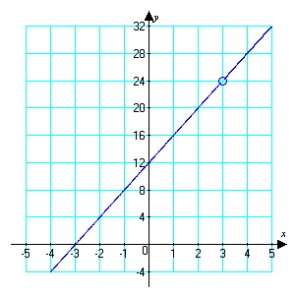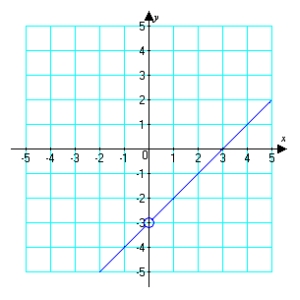Deck 14: Additional Topics in Algebra
Question
Question
Question
Question
Question
Question
Question
Question
Question
Question
Question
Question
Question
Question
Question
Question
Question
Question
Question
Question
Question
Question
Question
Question
Question

Unlock Deck
Sign up to unlock the cards in this deck!
Unlock Deck
Unlock Deck
1/25
Play
Full screen (f)
Deck 14: Additional Topics in Algebra
1
Find the right part of the equality.
A)
B)
C)
D)
E)
A)
B)
C)
D)
E)
2
Carry out the expansion. (2a + b) 9
A) 2a 9 + 2,304a 8 b + 4,608a 7 b 2 + 5,376a 6 b 3 + 4,032a 5 b 4 + 2,016a 4 b 5 + 672a 3 b 6 + 144a 2 b 7 + 18ab 8 + b 9
B) 512 a 9 + 2,304a 8 b - 4,608a 7 b 2 + 5,376a 6 b 3 - 4,032a 5 b 4 + 2,016a 4 b 5 - 672a 3 b 6 + 144a 2 b 7 - 18ab 8 + b 9
C) 512a 9 + 2,304a 8 b + 4,610a 7 b 2 + 5,376a 6 b 3 + 4,032a 5 b 4 + 2,016a 4 b 5 + 672a 3 b 6 + 144a 2 b 7 + 18ab 8 + b 9
D) 512a 9 + 2,304a 8 b - 4,608a 7 b 2 + 5,376a 6 b 3 - 4,032a 5 b 4 + 2,016a 4 b 5 - 672a 3 b 6 + 144a 2 b 7 - 18ab 8 + b 9
E) 512a 9 + 2,304a 8 b + 4,608a 7 b 2 + 5,376a 6 b 3 + 4,032a 5 b 4 + 2,016a 4 b 5 + 672a 3 b 6 + 144a 2 b 7 + 18ab 8 + b 9
A) 2a 9 + 2,304a 8 b + 4,608a 7 b 2 + 5,376a 6 b 3 + 4,032a 5 b 4 + 2,016a 4 b 5 + 672a 3 b 6 + 144a 2 b 7 + 18ab 8 + b 9
B) 512 a 9 + 2,304a 8 b - 4,608a 7 b 2 + 5,376a 6 b 3 - 4,032a 5 b 4 + 2,016a 4 b 5 - 672a 3 b 6 + 144a 2 b 7 - 18ab 8 + b 9
C) 512a 9 + 2,304a 8 b + 4,610a 7 b 2 + 5,376a 6 b 3 + 4,032a 5 b 4 + 2,016a 4 b 5 + 672a 3 b 6 + 144a 2 b 7 + 18ab 8 + b 9
D) 512a 9 + 2,304a 8 b - 4,608a 7 b 2 + 5,376a 6 b 3 - 4,032a 5 b 4 + 2,016a 4 b 5 - 672a 3 b 6 + 144a 2 b 7 - 18ab 8 + b 9
E) 512a 9 + 2,304a 8 b + 4,608a 7 b 2 + 5,376a 6 b 3 + 4,032a 5 b 4 + 2,016a 4 b 5 + 672a 3 b 6 + 144a 2 b 7 + 18ab 8 + b 9
512a 9 + 2,304a 8 b + 4,608a 7 b 2 + 5,376a 6 b 3 + 4,032a 5 b 4 + 2,016a 4 b 5 + 672a 3 b 6 + 144a 2 b 7 + 18ab 8 + b 9
3
Find the indicated term.
A) 101
B) 110
C) 220
D) 55
E) 111
A) 101
B) 110
C) 220
D) 55
E) 111
110
4
Evaluate the sum.
A)
B)
C)
D)
E)
A)
B)
C)
D)
E)

Unlock Deck
Unlock for access to all 25 flashcards in this deck.
Unlock Deck
k this deck
5
Evaluate and simplify.
A) 0
B) 4
C) 14
D) 9
E) 1
A) 0
B) 4
C) 14
D) 9
E) 1

Unlock Deck
Unlock for access to all 25 flashcards in this deck.
Unlock Deck
k this deck
6
Find the indicated term.
A)
B)
C)
D)
E)
A)
B)
C)
D)
E)

Unlock Deck
Unlock for access to all 25 flashcards in this deck.
Unlock Deck
k this deck
7
Carry out the expansion. (2 - 2x) 6
A) 64 - 387x - 957x 2 - 1,280x 3 - 960x 4 - 384x 5 - 64x 6
B) 64 + 384x + 960x 2 - 1,280x 3 + 960x 4 - 384x 5 + 64x 6
C) 64 - 384x - 960x 2 - 1,280x 3 - 960x 4 - 384x 5 - 64x 6
D) 64 - 384x + 960x 2 - 1,280x 3 + 960x 4 - 384x 5 + 64x 6
E) 64 - 387x + 960x 2 - 1,280x 3 + 960x 4 - 384x 5 + 64x 6
A) 64 - 387x - 957x 2 - 1,280x 3 - 960x 4 - 384x 5 - 64x 6
B) 64 + 384x + 960x 2 - 1,280x 3 + 960x 4 - 384x 5 + 64x 6
C) 64 - 384x - 960x 2 - 1,280x 3 - 960x 4 - 384x 5 - 64x 6
D) 64 - 384x + 960x 2 - 1,280x 3 + 960x 4 - 384x 5 + 64x 6
E) 64 - 387x + 960x 2 - 1,280x 3 + 960x 4 - 384x 5 + 64x 6

Unlock Deck
Unlock for access to all 25 flashcards in this deck.
Unlock Deck
k this deck
8
Find for and .
A)
B) limit does not exist
C)
D)
E)
A)
B) limit does not exist
C)
D)
E)

Unlock Deck
Unlock for access to all 25 flashcards in this deck.
Unlock Deck
k this deck
9
Use the graph to find 
A) 24
B)
C) 0
D) 12
E) limit does not exist

A) 24
B)
C) 0
D) 12
E) limit does not exist

Unlock Deck
Unlock for access to all 25 flashcards in this deck.
Unlock Deck
k this deck
10
Find the sum of the first 50 terms in an arithmetic series that has first term - 18 and 50th term 129.
A)
B)
C)
D)
E)
A)
B)
C)
D)
E)

Unlock Deck
Unlock for access to all 25 flashcards in this deck.
Unlock Deck
k this deck
11
For what natural numbers is the following inequality true?
A)
B)
C)
D)
E)
A)
B)
C)
D)
E)

Unlock Deck
Unlock for access to all 25 flashcards in this deck.
Unlock Deck
k this deck
12
For what natural numbers is the following inequality true?
A)
B)
C)
D)
E)
A)
B)
C)
D)
E)

Unlock Deck
Unlock for access to all 25 flashcards in this deck.
Unlock Deck
k this deck
13
The sequence is defined recursively. Compute the first five terms of the sequence.
A)
B)
C)
D)
E)
A)
B)
C)
D)
E)

Unlock Deck
Unlock for access to all 25 flashcards in this deck.
Unlock Deck
k this deck
14
Find the coefficient of the term containing a 4 in the expansion of .
A) 12,870
B) 495
C) 12,871
D) 25,740
E) 1,839
A) 12,870
B) 495
C) 12,871
D) 25,740
E) 1,839

Unlock Deck
Unlock for access to all 25 flashcards in this deck.
Unlock Deck
k this deck
15
Find the right part of the equality. ________
A)
B)
C)
D)
A)
B)
C)
D)

Unlock Deck
Unlock for access to all 25 flashcards in this deck.
Unlock Deck
k this deck
16
Find the third term in the expansion of (a - b) 27 .
A) - 17,550a 4 b 23
B) 17,550a 23 b 4
C) - 17,550a 23 b 4
D) 17,551a 23 b 4
E) - 17,551a 23 b 4
A) - 17,550a 4 b 23
B) 17,550a 23 b 4
C) - 17,550a 23 b 4
D) 17,551a 23 b 4
E) - 17,551a 23 b 4

Unlock Deck
Unlock for access to all 25 flashcards in this deck.
Unlock Deck
k this deck
17
The sum of three consecutive terms in an arithmetic sequence is 30, and their product is 750. Find the three terms. (Suggestion: Let x denote the middle term and d the common difference.)
A) 5, 9, 13
B) 4, 9, 14
C) 5, 10, 15
D) 1, 10, 15
E) 6, 10, 14
A) 5, 9, 13
B) 4, 9, 14
C) 5, 10, 15
D) 1, 10, 15
E) 6, 10, 14

Unlock Deck
Unlock for access to all 25 flashcards in this deck.
Unlock Deck
k this deck
18
Express as a fraction.
A)
B)
C)
D)
E)
A)
B)
C)
D)
E)

Unlock Deck
Unlock for access to all 25 flashcards in this deck.
Unlock Deck
k this deck
19
Find the common difference d for the following arithmetic sequence. 12, 7, 2, - 3, ...
A) 5
B) - 5
C) 3
D) - 3
E) - 6
A) 5
B) - 5
C) 3
D) - 3
E) - 6

Unlock Deck
Unlock for access to all 25 flashcards in this deck.
Unlock Deck
k this deck
20
Find the right part of the equality. ________
A)
B)
C)
D)
E) none of the above
A)
B)
C)
D)
E) none of the above

Unlock Deck
Unlock for access to all 25 flashcards in this deck.
Unlock Deck
k this deck
21
Use the position function to find the velocity in feet/second at time seconds. The velocity at time seconds is given by
A) limit does not exist
B) 32 feet/second
C) 64 feet/second
D) 0 feet/second
E) -64 feet/second
A) limit does not exist
B) 32 feet/second
C) 64 feet/second
D) 0 feet/second
E) -64 feet/second

Unlock Deck
Unlock for access to all 25 flashcards in this deck.
Unlock Deck
k this deck
22
Find .
A)
B) limit does not exist
C)
D)
E) 0
A)
B) limit does not exist
C)
D)
E) 0

Unlock Deck
Unlock for access to all 25 flashcards in this deck.
Unlock Deck
k this deck
23
Find by direct substitution.
A)
B)
C)
D)
E)
A)
B)
C)
D)
E)

Unlock Deck
Unlock for access to all 25 flashcards in this deck.
Unlock Deck
k this deck
24
Use the graph to determine (if it exists). 
A) 0
B) 3
C) -3
D) limit does not exist
E) 6

A) 0
B) 3
C) -3
D) limit does not exist
E) 6

Unlock Deck
Unlock for access to all 25 flashcards in this deck.
Unlock Deck
k this deck
25
Find .
A) limit does not exist
B) 5
C) 50
D) 75
E) 15
A) limit does not exist
B) 5
C) 50
D) 75
E) 15

Unlock Deck
Unlock for access to all 25 flashcards in this deck.
Unlock Deck
k this deck



